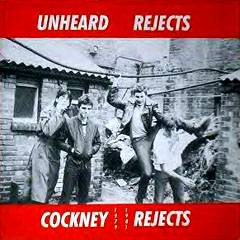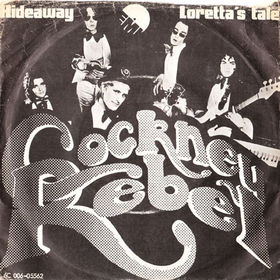
Rhyming slang is a form of slang word construction in the English language. It is especially prevalent among Cockneys in England, and was first used in the early 19th century in the East End of London; hence its alternative name, Cockney rhyming slang. In the US, especially the criminal underworld of the West Coast between 1880 and 1920, rhyming slang has sometimes been known as Australian slang.

A skinhead or skin is a member of a subculture that originated among working-class youths in London, England, in the 1960s. It soon spread to other parts of the United Kingdom, with a second working-class skinhead movement emerging worldwide in the late 1970s. Motivated by social alienation and working-class solidarity, skinheads are defined by their close-cropped or shaven heads and working-class clothing such as Dr. Martens and steel toe work boots, braces, high rise and varying length straight-leg jeans, and button-down collar shirts, usually slim fitting in check or plain. The movement reached a peak at the end of the 1960s, experienced a revival in the 1980s, and, since then, has endured in multiple contexts worldwide.
Cockney is a dialect of the English language, mainly spoken in London and its environs, particularly by Londoners with working-class and lower middle-class roots. The term Cockney is also used as a demonym for a person from the East End, or, traditionally, born within earshot of Bow Bells.

Cockney Rejects are an English punk rock band that formed in the East End of London in 1978. Their 1980 song "Oi, Oi, Oi" was the inspiration for the name of the Oi! music genre. The band members are supporters of West Ham United, and pay tribute to the club with their hit cover version of "I'm Forever Blowing Bubbles", a song traditionally sung by West Ham supporters.
Angelic Upstarts are an English punk rock / Oi! band formed in South Shields in 1977. AllMusic calls them "one of the period's most politically charged and thought-provoking groups". The band espouse an anti-fascist and socialist working class philosophy, and have been associated with the punk and skinhead subcultures.
Mockney is an affected accent and form of speech in imitation of cockney or working-class London speech, or a person with such an accent. A stereotypical mockney speaker comes from an upper-middle-class background.
The Power and the Glory is a 1940 novel by Graham Greene.
Oi! is a subgenre of punk rock that originated in the United Kingdom in the late 1970s. The music and its associated subculture had the goal of bringing together punks, skinheads, and other disaffected working-class youth. The movement was partly a response to the perception that many participants in the early punk rock scene were, in the words of The Business guitarist Steve Kent, "trendy university people using long words, trying to be artistic... and losing touch."

The 4-Skins are a punk rock band from the East End of London, England. Originally composed of Gary Hodges (vocals), 'Hoxton' Tom McCourt (guitar), Steve 'H' Hamer (bass) and John Jacobs (drums), the group was formed in 1979 and disbanded in 1984 – although new line-ups formed in 2007 and 2008. Many of their songs dealt with violent topics, but the band has claimed they were discussing the realities of inner city life, not promoting violence. Other 4-Skins song topics include police harassment, political corruption, war and unemployment.

'Hoxton' Tom McCourt is the former bassist and bandleader of punk rock/Oi! band, The 4-Skins. He was one of the most influential members of the skinhead revival of 1977 to 1978, the mod revival of 1978 to 1979 and the Oi! movement from 1979 to 1984.
Street punk is an urban working class-based subgenre of punk rock, which emerged as a rebellion against the perceived artistic pretensions of the first wave of British punk. The earliest street punk songs emerged in the late 1970s by bands including Sham 69, the U.K. Subs and Cockney Rejects. By 1982, bands such as Discharge, GBH and the Exploited had pushed this sound to become faster and more abrasive, while also embracing the influence of heavy metal music. In the 1990s and 2000s, a street punk revival began with bands such as the Casualties, Rancid and the Analogs.
Red Alert are аn English punk/oi!-band, formed in Sunderland, England, in May 1979. The group released five EPs and a studio album, and appeared on numerous compilations, including Punk And Disorderly and Carry On Oi!. Three of the band's releases reached the Top 30 in the UK Indie Chart. Red Alert broke up in 1984, reformed five years later and continued touring and recording.

Oi! The Album is a 1980 Oi! compilation album, released in 1980 by EMI, then re-released by Captain Oi! and Cleopatra Records on CD in later years. It was conceived and compiled by then Sounds columnist Garry Bushell who had coined the phrase "Oi!" to denote what he called a new breed of working class punk rock with "terrace" or mob choruses. Of the bands labelled 'Oi!', Bushell had managed the Cockney Rejects and went on to manage the Blood.

Garry Bushell is an English newspaper columnist, rock music journalist, television presenter, author, musician and political activist. Bushell also sings in the Cockney Oi! bands GBX and the Gonads. He managed the New York City Oi! band Maninblack until the death of the band frontman Andre Schlessinger. Bushell's recurring topical themes are comedy, country and class. He has campaigned for an English Parliament, a Benny Hill statue and for variety and talent shows on TV. He has been a columnist for several newspapers, including The Sun, The People and the Daily Star Sunday, and has worked as the review editor for the Sunday Express.

Greatest Hits Vol. 1 is the first album by the band Cockney Rejects released in 1980. Despite the title, it is not a greatest hits compilation album.

Greatest Hits Vol. II is the second album by the band Cockney Rejects released in 1980. Despite the title, it is not a greatest hits compilation album.

Unheard Rejects is an album by the band Cockney Rejects released in 1985. It is a collection of demo tracks recorded between 1979 and 1981.

"I Can't Even Touch You" is a song by the English singer-songwriter Steve Harley, released under his band's name Steve Harley & Cockney Rebel by Chrysalis as a non-album single on 12 March 1982. The song was written by Harley and produced by Midge Ure.

"Hideaway" is a song by the British rock band Cockney Rebel, fronted by Steve Harley. Released as the opening track on the band's 1973 debut album The Human Menagerie, "Hideaway" was released in 1974 as a single in Denmark only. It was written by Harley and produced by Neil Harrison.












